October 2024 FloridAgriculture eNewsletter
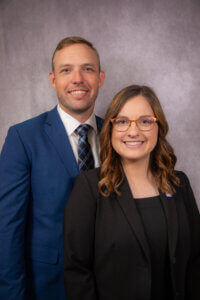 Jared and Kamryn Smith have a passion for agriculture that runs deep. As individuals, it is evident how much they love and appreciate the industry, and as a couple, their passion is magnified. Although they have different ties to agriculture, they have found ways to intertwine those ties and amplify their voice for the industry. The couple serves on the state Young Farmers & Ranchers Leadership Group, representing Flagler County and District 4.
Jared and Kamryn Smith have a passion for agriculture that runs deep. As individuals, it is evident how much they love and appreciate the industry, and as a couple, their passion is magnified. Although they have different ties to agriculture, they have found ways to intertwine those ties and amplify their voice for the industry. The couple serves on the state Young Farmers & Ranchers Leadership Group, representing Flagler County and District 4.
For more than one hundred years, Jared’s family has grown a variety of commodities from row crops and sod to cattle and hay. He is the sixth generation to not only grow up, but farm on his family’s land in St. Johns County. He received his degree in general agriculture from Abraham Baldwin Agricultural College and is a sales representative for Speedling Incorporated as well as an employee for Smith and Johns, Inc.
Growing up around Farm Bureau, Jared had numerous opportunities to attend events throughout his childhood. Some of his fondest memories are those traveling to Tallahassee for Farm Bureau Day and attending county and state events with his parents. He has been a key member in revitalizing the Flagler County Farm Bureau Board and continues to serve on the board.
“Growing up, the only place I wanted to be was on a tractor with my dad, uncle and grandad,” said Smith. “When people ask me what I do to relieve stress, I tell them I get up, go to work and get on a tractor.”
Although Kamryn grew up in rural Clay County, she didn’t get her first taste of agriculture until middle school. During her freshman year of high school, she became more involved in the FFA program and fell in love with the industry. Encouraged by her high school agriculture teacher, her passion led her to the University of Florida where she received her bachelor of science in agriculture education, and later her master’s in agribusiness. Kamryn is now an agriculture teacher alongside the teacher who ignited her passion.
“I grew up with little to no connection to production agriculture, until I got involved in FFA,” said Kamryn. “With all the opportunities that it provided, I realized just how important agriculture is and how I can make an impact in the industry. I couldn’t imagine my life any other way than getting to educate, advocate, and be a part of agriculture.”
Although the two have had different agricultural paths, their passion for the industry is what brought them together. The couple met at a Young Farmers & Ranchers Leadership Conference in 2019, and the rest is history. Together, they founded their own business, Kattle & Jabor, that they run cattle through.
The couple has enjoyed serving on the state YF&R Leadership Group and the ample opportunities it has presented them. With one year under their belts, they are excited for the upcoming events and farm tours they’ll be attending. Additionally, they have been able to strengthen connections across the state and work with friends and colleagues throughout the industry.
“I love the community and being around folks with like minds,” said Jared. “It’s like church, we all go through different struggles but when we go to church, we can all support and help each other. It’s the same with Farm Bureau, we don’t deep dive into our issues, but we can encourage each other and come together because we all have common goals and objectives.”
Throughout their individual and joint experiences, Jared and Kamryn continue to strengthen their tie to agriculture.
“I’m tied to agriculture through my career, my family and my passion,” said Jared. “My career is agriculturally based, my wife and I met because of Farm Bureau.”
“I am tied to agriculture in everything I do; from being a high school agriculture teacher and FFA Advisor, living out my dream of running a cow-calf operation and advocating for the industry,” said Kamryn. “I am thankful for all of the opportunities that the industry, along with Farm Bureau, has given me.”

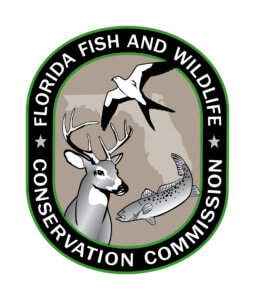 Landowners who maintain and improve Florida panther habitat of high conservation priority on their property may be eligible for rewards. Landowners within the following counties are eligible for participation: Broward, Charlotte, Collier, DeSoto, Glades, Hardee, Hendry, Highlands, Hillsborough, Lee, Manatee, Miami-Dade, Monroe, Okeechobee, Osceola, Polk and Sarasota.
Landowners who maintain and improve Florida panther habitat of high conservation priority on their property may be eligible for rewards. Landowners within the following counties are eligible for participation: Broward, Charlotte, Collier, DeSoto, Glades, Hardee, Hendry, Highlands, Hillsborough, Lee, Manatee, Miami-Dade, Monroe, Okeechobee, Osceola, Polk and Sarasota.
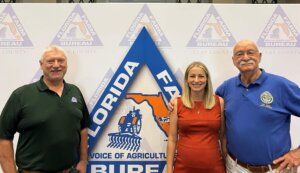
 The Occupational Safety and Health Administration (OSHA) published their notice of proposed rulemaking (NPRM) on a new standard titled Heat Injury and Illness Prevention in Outdoor and Indoor Work Settings (Heat Rule).
The Occupational Safety and Health Administration (OSHA) published their notice of proposed rulemaking (NPRM) on a new standard titled Heat Injury and Illness Prevention in Outdoor and Indoor Work Settings (Heat Rule).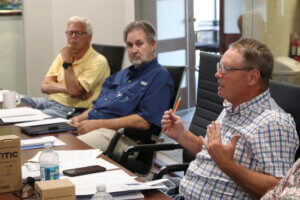 Florida Farm Bureau’s grassroots policy development is in full swing as members from across the state gathered during August to participate in the organization’s commodity and issue based advisory committee fall meetings. These committees meet twice annually to review current Farm Bureau policy and to surface emerging issues that may need heightened focus in the organization’s advocacy efforts.
Florida Farm Bureau’s grassroots policy development is in full swing as members from across the state gathered during August to participate in the organization’s commodity and issue based advisory committee fall meetings. These committees meet twice annually to review current Farm Bureau policy and to surface emerging issues that may need heightened focus in the organization’s advocacy efforts.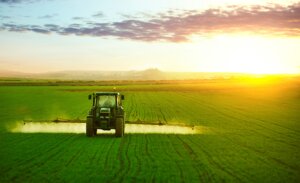 The U.S. Food and Drug Administration (FDA) has published a final rule that revises pre-harvest agricultural water provisions in the FSMA Produce Safety Rule. The rule replaces the previous microbial quality criteria and testing requirements with systems-based, pre-harvest agricultural water assessments.
The U.S. Food and Drug Administration (FDA) has published a final rule that revises pre-harvest agricultural water provisions in the FSMA Produce Safety Rule. The rule replaces the previous microbial quality criteria and testing requirements with systems-based, pre-harvest agricultural water assessments. Sixth generation Floridian Bobby Floyd grew up on his family’s cow/calf operation in Zolfo Springs. Throughout his life he has helped run cattle on the farm and has played an active role in the farm’s day-to-day operation.
Sixth generation Floridian Bobby Floyd grew up on his family’s cow/calf operation in Zolfo Springs. Throughout his life he has helped run cattle on the farm and has played an active role in the farm’s day-to-day operation.
